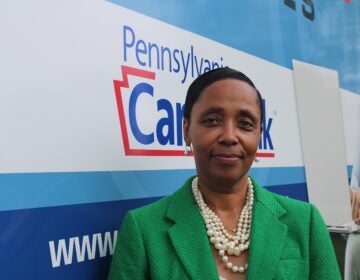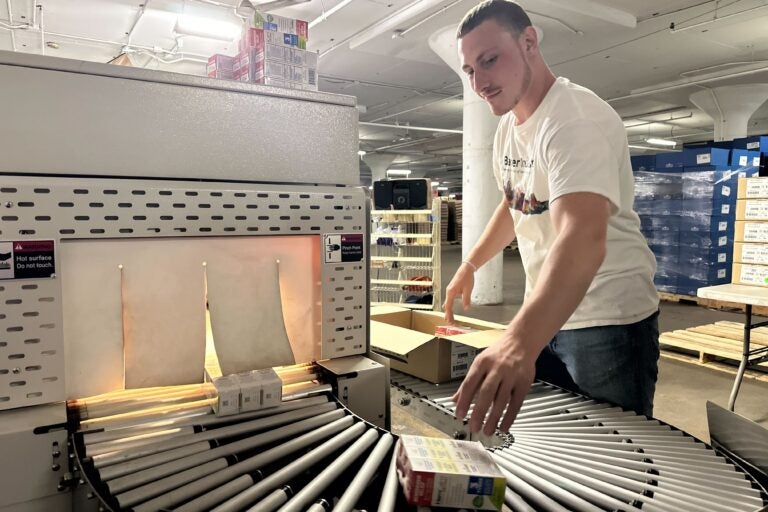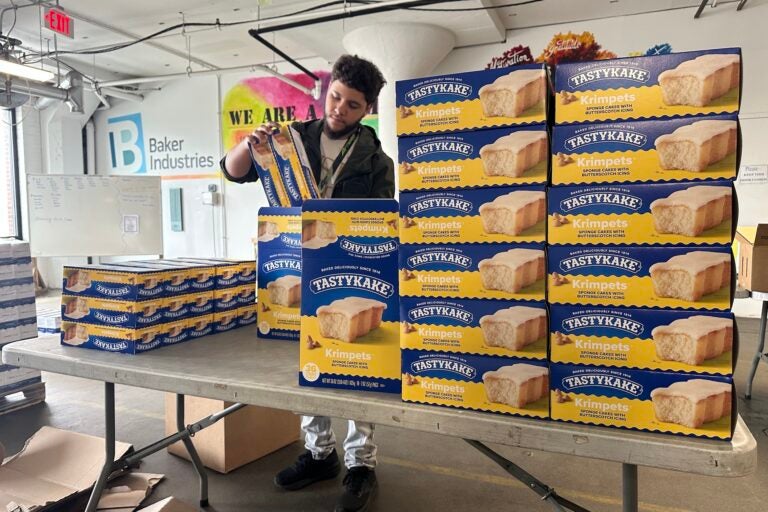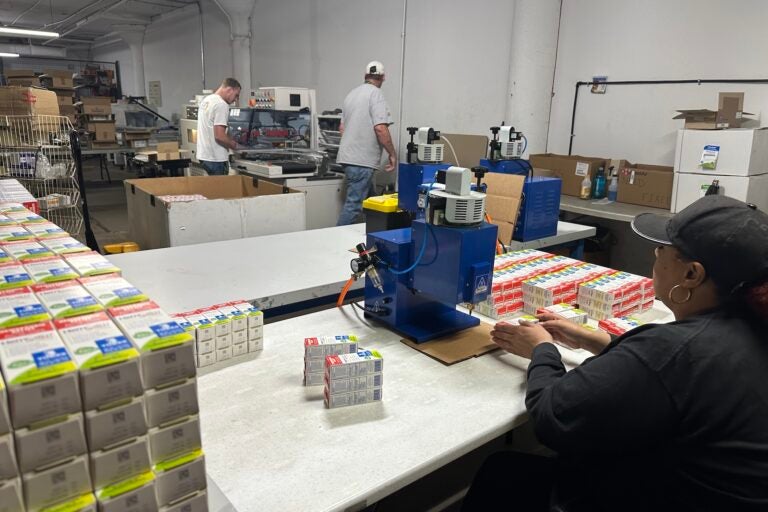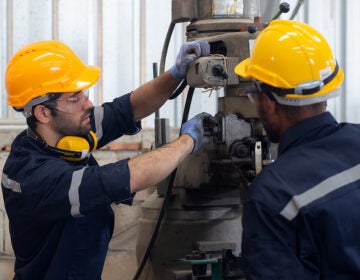Meet the 99-year-old who has helped 12,000 adults get back to work in Kensington and beyond
Over the past 45 years, Baker Industries has helped tens of thousands of adults transition back into the workforce in both Malvern and Philadelphia.
Listen 1:06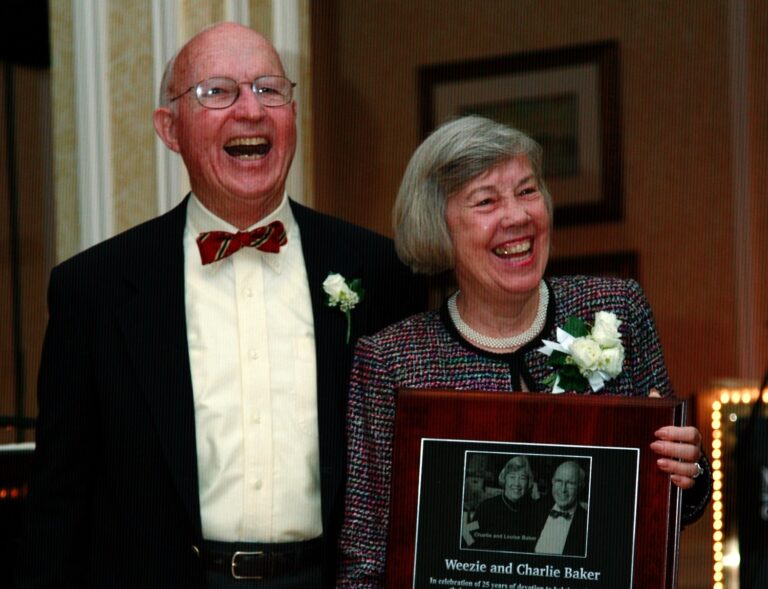
Charlie P. Baker III and his wife Louise Baker accept an award in 2022 for their work at the nonprofit. Baker is now 99 years old. Louise died earlier this year. (Courtesy of Baker Industries)
From Philly and the Pa. suburbs to South Jersey and Delaware, what would you like WHYY News to cover? Let us know!
At nearly a century old, Charlie Baker III has lived many lives — soldier, entrepreneur and quiet architect of second chances. The Philadelphia native and World War II veteran is turning 100 this month, marking a milestone not just of age, but of impact. As co-founder of Baker Industries, he’s helped more than 12,000 adults rebuild their lives and transition back into the workforce after a struggle in their life, whether it’s a disability, addiction recovery or incarceration.
“Most companies don’t want to hire people like that,” Baker said when reached by phone in Delaware this week.
For him, the rejection felt personal: his youngest son, Justin Baker, has lived with a traumatic brain injury since childhood. The condition has triggered epilepsy and seizures, all of which have made it difficult for him to work outside the home.
In 1980, Baker and his wife Louise created the organization as an alternative employment option for adults with special needs out of their garage in Stafford, an unincorporated community in Chester County.
“The idea was that we would introduce the most basic elements of work. For instance, showing up on time,” Baker said.
Baker’s ties to the community run deep. He was raised in a Center City, Philadelphia hotel at 11th and Spruce Street, where his father was a manager. After graduating from West Point in 1946, he served in the U.S. Army for nearly eight years.
His father took over a modest chemical business, with three employees. Over the next 25 years Baker transformed it, expanding its workforce before selling it in 1980.
Baker Industries was also originally incorporated as a for-profit company. It only later transitioned to nonprofit headquartered in Malvern, with a warehouse in Kensington because of the workforce development benefits, Baker said.
He credits the organization’s longevity to the fact he hired mostly core administrators from the for-profit rather than nonprofit sector who had expertise in their field, such as logistics.
Customers include Philadelphia manufacturers like Tasty Baking Co., at-home test kit manufacturers, a homeopathic medicine brand and a local play putty toymaker among others.
His spouse, Louise, was instrumental to the nonprofit’s success, he said. She died earlier this year at 93 years old after more than seven decades of marriage and raising three children.
After three decades, their youngest son has retired from Baker Industries and now resides in a specialty care home. Their eldest son, a longtime technology workers, is nearing retirement at 70 years old. And Sandy, their daughter and a retired teacher, is their father’s caretaker.
Charlie is still on the board of directors of the nonprofit. He’s not sure about the key to his own longevity, but it’s likely a sense of purpose and physical activity, he said.
“I wish I knew,” he said, laughing. “I think the main thing that has affected my health is that I’m sort of a sports nut.”
Like tennis, skiing, sailing or squash – the latter of which he still plays about once a week. When asked about any life advice, he laughed again.
“I’m the last person in the world who would be advising anybody, but I just say keep active,” he said. “That’s my philosophy. Don’t sit back and do nothing but keep active and have a purpose.”
For Charlie, that sense of purpose included responding to the needs of the Kensington community, where the warehouse opened for operation in 1988.
At the time, a church member who worked with the formerly homeless, those recovering from substance abuse or people recently released on parole wanted help to develop a workforce training program.
Now Baker Industries president Nic Watson is helping move that program forward.
“We’re trying to rebuild the community of Philadelphia by rebuilding the business community and the people in it at the same time. I think work as a source of dignity is our strength both as a nonprofit and as a business,” Watson said.
Inside the Kensington warehouse there are assembly lines of workers, like at the shrink wrap machine station, where each is sealed with precision and repetition.
One person glues boxes of medicine together, another pushes a multipack of boxes into the hot oven that melts plastic and a third person packages those medications for shipping to retailers.
On a different assembly line, Tastykake products like mini-muffins or krimpets from the Philadelphia bakery operation are repackaged for retailers. During an average week, the facility processes about 500 boxes of krimpets or 1,500 of the mini-muffins.
But for most workers, the job is not forever. Instead, employees graduate after meeting their goals and learning new skills after a year. It allows them to take an $11-an-hour job and apply for higher-paying jobs — the average graduate earns at least $19 an hour or higher.
“We rely on employers to do the specific training but they come in with all the professional skills and the understanding what it takes to work in a modern warehouse,” he said. “We want them to get into a job where they can have an opportunity to move up or to build better lives for themselves and their family and really break those cycles of either incarceration or poverty so that those things don’t become generational for them.”
Flexibility for new employees who are transitioning is key because it’s likely they might need time off for court dates, require paperwork for halfway houses or offer other support.
“We teach them how if they have a problem with a colleague, how to diffuse the problem, how to address the issue … they take it to their other employers,” said Lisette Morales, senior production manager at Baker Industries.
About 30% of the workforce is disabled and those employees typically work with the company long term, but 70% is transitional employment.
The nonprofit is hoping to keep growing its workforce, but it needs more customers for its assembly lines to expand, Watson said.
“The sad fact of it is that there’s no practical end to how many people could use a transitional service like this to get back into the workforce,” Watson said. “We really hope over the next five to 10 years to grow that number of 200 participants in a year to more like four or five hundred.”
On June 25, which happens to be Charlie’s 100th birthday, Baker Industries is hosting a Kensington community resource fair from 1:00 to 3:30 p.m. at 3630 I Street.

Get daily updates from WHYY News!
WHYY is your source for fact-based, in-depth journalism and information. As a nonprofit organization, we rely on financial support from readers like you. Please give today.



